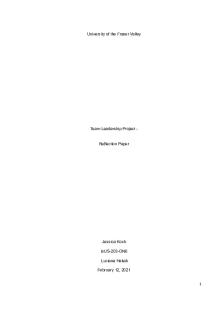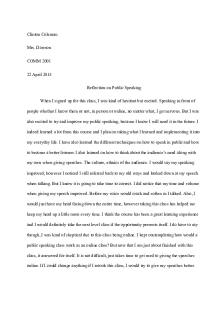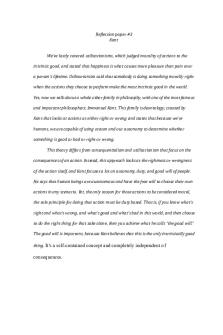Reflection Paper shopkeeper PDF

| Title | Reflection Paper shopkeeper |
|---|---|
| Course | General Chemistry for Engineering Students |
| Institution | Texas A&M University |
| Pages | 2 |
| File Size | 51.2 KB |
| File Type | |
| Total Downloads | 118 |
| Total Views | 138 |
Summary
bleh vleh bleh bleh bbleh bleh bleh bleh bleh bleh bleh...
Description
Reflection Paper: Shopkeeper’s Millennium
‘Shopkeeper’s Millennium’ by historian Paul Johnson, is a case study about Rochester revival revolving around the efforts of Charles Finney. Finney was an evangelist church minister who spent about six months in Rochester preaching about Christianity and changed the political and social scenario of the place. This event was part of a greater movement called the ‘Second Great Awakening’ where many people joined evangelical churches.
In the 25th edition preface for the book, Paul Johnson says that he has received a good amount of criticism for his work. He says that he understands where this comes from and that he would definitely write the book and research in a much different way if he were to write the book in modern times. Yet, he feels that his findings are correct and are based on ‘empirical’ sources which include church and property records.
Rochester, a product of industrialisation, was a very new city. The population consisted mainly of businessmen who ran manufacturing units in the city, and the working class who served as labourers in these factories. As the population of the city increased, the city got out of control of the businessmen. There was unruly behaviour, violence and alcohol problems caused by the young working class. The businessmen tried to regain control of the city by forming a municipal government, but these efforts also failed.
This is when Charles Finney came to the city and preached about religion to people in Rochester. He formed an army of religious workers who went on and spread the word of god. Slowly, shopkeepers and merchants used religion as a tool and made it compulsory for the workers to
attend the sermons. Ultimately, author Paul Johnson’s thesis is that evangelical methods provided the businessmen with a tool to impose control over the working class of the city and regain the status of social order in the society.
A number of other changes also occurred in the late 1820s. Before the divide between the working class and the middle class, it was common for the business owners to provide lodging to the working class and even consider them to be a part of their family. This changed drastically as the working class slowly moved to a separate part of town and grew far from the middle class. This also led to violence and spats between the two.
Reading this book changed my perspective about things in many ways. I understood that it is very important for people to be attached to something that is greater than themselves. It makes them feel involved and they feel like a part of something. This is one of the reasons why the social divide between the two economic classes reduced after the religious movement.
As people got more involved in church and religion, they felt a part of a community and they felt it their social responsibility to act civilly. This is a very obvious flow of things. Just as one wouldn't want to act in a bad manner or be violent with someone from his own family, these people felt a part of a community and stopped acting wrongly....
Similar Free PDFs

Reflection Paper shopkeeper
- 2 Pages

Reflection Paper
- 2 Pages

Reflection Paper
- 4 Pages

Reflection Paper
- 2 Pages

Reflection paper
- 3 Pages

Reflection paper for pino
- 2 Pages

Conflict Reflection Paper
- 8 Pages

Haudenosaunee reflection paper
- 3 Pages

Reflection paper rubric 05
- 1 Pages

Managment Reflection Paper
- 12 Pages

Reflection Paper chapter 5
- 1 Pages

Bev Reflection Paper 1
- 4 Pages

Paul Simon Reflection Paper
- 2 Pages

Reflection-paper-mulanay
- 2 Pages

Reflection Paper Sociology
- 5 Pages
Popular Institutions
- Tinajero National High School - Annex
- Politeknik Caltex Riau
- Yokohama City University
- SGT University
- University of Al-Qadisiyah
- Divine Word College of Vigan
- Techniek College Rotterdam
- Universidade de Santiago
- Universiti Teknologi MARA Cawangan Johor Kampus Pasir Gudang
- Poltekkes Kemenkes Yogyakarta
- Baguio City National High School
- Colegio san marcos
- preparatoria uno
- Centro de Bachillerato Tecnológico Industrial y de Servicios No. 107
- Dalian Maritime University
- Quang Trung Secondary School
- Colegio Tecnológico en Informática
- Corporación Regional de Educación Superior
- Grupo CEDVA
- Dar Al Uloom University
- Centro de Estudios Preuniversitarios de la Universidad Nacional de Ingeniería
- 上智大学
- Aakash International School, Nuna Majara
- San Felipe Neri Catholic School
- Kang Chiao International School - New Taipei City
- Misamis Occidental National High School
- Institución Educativa Escuela Normal Juan Ladrilleros
- Kolehiyo ng Pantukan
- Batanes State College
- Instituto Continental
- Sekolah Menengah Kejuruan Kesehatan Kaltara (Tarakan)
- Colegio de La Inmaculada Concepcion - Cebu
